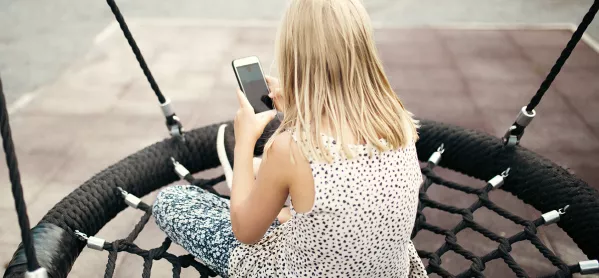Online Safety Bill: Just 9% of teachers think pupils will be safer

Just 9 per cent of teachers are confident that students will be safer online following the introduction of the new Online Safety Bill, Tes can reveal.
The Online Safety Bill, which was first introduced to Parliament in March last year, aims to create a new set of laws to protect children and adults online and to make social media companies “more responsible for their users’ safety on their platforms”.
But 15 per cent of teachers think the bill has nothing or very little that will protect students online.
These findings come from a Teacher Tapp survey of 8,076 teachers in February 2023, carried out on behalf of Bett and published today.
Julie McCulloch, director of policy at the Association of School and College Leaders, said that the sector was “a long way from being able to determine how effective the measures in the bill will be in practice” and from determining “the long-term impact of technology on young people’s health and wellbeing”.
- Frankie Thomas: The tragic pupil death all schools must learn from
- Online safety: How schools can tackle post-pandemic concerns
- Safeguarding: Keeping Children Safe in Education - the new updates
Four in 10 respondents to the Teacher Tapp survey said they thought that the Online Safety Bill, which is currently in the committee stage of the House of Lords, could do more but it is a step in the right direction.
However, one-third of respondents (33 per cent) said they did not know enough about the Online Safety Bill.
Primary teachers were more confident about the potential of the bill, with 12 per cent of these respondents saying they think the legislation will make pupils safer online, compared with just 6 per cent of teachers in secondary settings.
And more teachers in secondary settings said the Online Safety Bill would do nothing or very little to protect students online - 18 per cent, compared with 12 per cent in primary.
Will the Online Safety Bill do enough?
Ms McCulloch said that children “must be able to grow up without being exposed to inappropriate and harmful material”.
She added that the union believes the bill “is a step in the right direction towards this”, but it is a “major frustration” that it has taken “so long to get to this point”.
“There will undoubtedly be issues in the future that the bill does not sufficiently cover. It is therefore right for it to be kept under review and for schools to be given further resources and support in dealing with problems that occur as a result of social media and other forms of online technology,” Ms McCulloch said.
And Sarah Hannafin, senior policy adviser for school leaders’ union the NAHT, said that while the bill will be a “step in the right direction”, the union’s members “agree that more is needed”.
Ms Hannafin said that the safeguarding of children and young people online should be a “collaborative approach”, adding that government “has a significant role to play, as does education, but the role of parents is key and much more needs to be done to support parents in this role”.
The Department for Digital, Culture, Media and Sport said that the bill will force social media platforms to remove illegal content quickly or prevent it from appearing in the first place and enforce age limits and age-checking measures.
The bill’s overall aim is to ensure that the “risks and dangers posed to children on the largest social media platforms are more transparent, including by publishing risk assessments”.
In January the government also published guidance for school leaders, school staff and governing bodies on how to teach online safety in schools.
This includes helping pupils to evaluate what they see online, to recognise techniques used for persuasion and to identify online risks.
A government spokesperson said: “Once the Online Safety Bill comes into force, unregulated social media companies will be required to protect children from accessing illegal and harmful material on their platforms, including cyberbullying, harassment and pornography.
“The groundbreaking new law will offer a step change in online child safety, ensuring our young people continue to have positive experiences using the internet.”
You need a Tes subscription to read this article
Subscribe now to read this article and get other subscriber-only content:
- Unlimited access to all Tes magazine content
- Exclusive subscriber-only stories
- Award-winning email newsletters
Already a subscriber? Log in
You need a subscription to read this article
Subscribe now to read this article and get other subscriber-only content, including:
- Unlimited access to all Tes magazine content
- Exclusive subscriber-only stories
- Award-winning email newsletters



